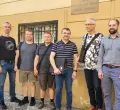


At the age of nearly 93, Professor Václav Brož, our esteemed and long-time colleague, has passed away.

Our students were successful in the XXII. edition of the Czech Transport Construction 2024 competition in the Student category.

We were pleased to welcome Mr. Director Ing. Josef Ineman, his deputy Ing. Karel Zíka, and other teachers from SPŠD Masná to our faculty.

20.-21. October 2025
Bratislava, Hotel Saffron

Tuesday, June 10, 2025, 14:00-16:00
Conference room at Florenc
The Faculty of Transportation offers a wide range of study programs covering all areas of transportation. Whether you are interested in railways, aviation, road transport, or logistics, you will find the right program with us.
Discover the world of transportation through innovative and practically oriented programs.
Take your knowledge to the next level with our master's programs.
Kickstart your journey to scientific discoveries and deeper understanding of transportation.




Imagine a place where not only transportation develops, but also your visions of the future.
In our laboratories and specialized workplaces, we are not afraid to dive into the unknown, whether it is in the field of transportation optimization, autonomous vehicles, railways, designing effective measures, or sustainable transportation solutions.
Studying at the Faculty of Transportation of CTU is not just about theory. Our students experience a unique project-based learning concept that allows them to change the world of transportation even before they graduate. Take a look at some interesting projects we are working on at the faculty.


